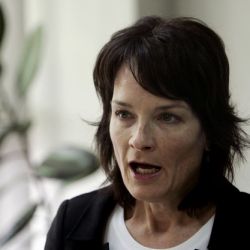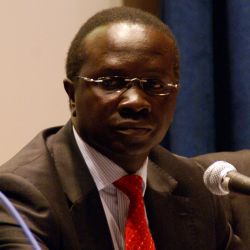 Kayunga is part of Buganda kingdom, but a minority community in the area is opposed to the trip. Kingdom officials say the central government is trying to thwart the visit. "The available evidence raises serious concerns that police used excessive force in confronting demonstrators," Georgette Gagnon, right, Africa director at Human Rights Watch (HRW), said in a statement. "A thorough investigation is needed to find out who is responsible." Riots continued across the city and in several neighbouring districts on 11 September, with local media reporting five more people gunned down by the police. The Ugandan police deny the allegations.
Kayunga is part of Buganda kingdom, but a minority community in the area is opposed to the trip. Kingdom officials say the central government is trying to thwart the visit. "The available evidence raises serious concerns that police used excessive force in confronting demonstrators," Georgette Gagnon, right, Africa director at Human Rights Watch (HRW), said in a statement. "A thorough investigation is needed to find out who is responsible." Riots continued across the city and in several neighbouring districts on 11 September, with local media reporting five more people gunned down by the police. The Ugandan police deny the allegations.
 The government has also suspended four Luganda language FM stations on the grounds that they were instigating violence. Before the British colonized it in the 19th century, Uganda comprised several kingdoms – most of which eventually lost their political clout. In 1967, kingdoms were abolished by President Milton Obote. In 1993, President Yoweri Museveni, right, restored them, but as cultural institutions.
The government has also suspended four Luganda language FM stations on the grounds that they were instigating violence. Before the British colonized it in the 19th century, Uganda comprised several kingdoms – most of which eventually lost their political clout. In 1967, kingdoms were abolished by President Milton Obote. In 1993, President Yoweri Museveni, right, restored them, but as cultural institutions.
The main kingdoms include Uganda’s largest and most politically powerful kingdom, Buganda, located in the central region along the shores of Lake Victoria. Kampala is also home to Mengo, the seat of the Kabaka (king). The Baganda are the largest ethnic community in Uganda, with an estimated five million people. During the colonial era, Buganda became the most influential kingdom in Uganda when the British rewarded it for its collaboration by giving it territories that belonged to the western kingdom of Bunyoro. Many Baganda have, for several years, unsuccessfully lobbied the government to introduce a federal form of government that would give some autonomy to the regions. The current kabaka is Ronald Muwenda Mutebi II.
The kingdom of Bunyoro, with about 700,000 people, is in western Uganda along the shores of Lake Albert. It casts itself as the oldest East African kingdom, and is ruled by an Omukama. Historically one of the most militarily powerful kingdoms, Bunyoro opposed colonization and paid for it with the loss of some territory. Much of the oil recently discovered in Uganda is in this region. The current Omukama is Solomon Gafabusa Iguru 1, the 27th king of Bunyoro.
Traditionally, the Acholi people of northern Uganda were organized in groups of clans presided over by a Rwot, or paramount chief. Two decades of war in the north between the government and Lord’s Resistance Army rebels, however, forced about two million Acholi to abandon their homes and seek refuge in camps. Currently, the kingdom is using traditional Acholi justice systems – such as mato oput, where the offender confesses his crime and is absolved – to try to build peace and reconciliation. The current Rwot is David Acana Onen II.
On the eastern shores of Lake Victoria where the source of the River Nile is located, Busoga is one of the country’s oldest kingdoms. Ruled by a Kyabazinga, the kingdom has about two million subjects. A succession struggle followed the death in 2008 of the previous Kyabazinga, Henry Wako Muloki. In June, Prince Edward Columbus Wambuzi installed himself as the new Kyabazinga, but opposition remains. Also in western Uganda, the Toro kingdom – with about 800,000 subjects – was formerly part of Bunyoro; its leader is also called the Omukama.
The kingdom has close ties with Libyan leader Muammar Ghaddafi, who was made defender of the Toro kingdom in 2001. The current Omukama of Toro is Oyo Nyimba Kabamba Iguru Rukidi IV, who became the world’s youngest monarch at the age of three in 1995. Located in southwestern Uganda and traditionally ruled by an Omugabe, the Banyankore people (also known as the Banyankole) are divided into two groups with a total population of 2.3 million – the minority, mainly pastoralist Bahima, and the mainly agriculturalist Bairu.
Although it is one of Uganda’s oldest kingdoms, Nkore (also known as Ankole) has not had its title returned, so its leader, John Barigye, is officially regarded only as a prince. Several other kingdoms and chiefdoms are officially recognized by the government, including the union of Alur chiefdoms, the Iteso paramount chieftancy, the paramount chieftaincy of Lango and the Padhola state.
In an interview with Reuters, Human Rights Watch condemns Ugandan police for its excessive use of force. The police admits that some of its officers "overreacted" and the Ugandan government expresses its regret at the loss of life, and offers its condolences to those bereaved. -The response by Ugandan police to rioting in the capital Kampala last week was unwarranted, HRW said, and added that it had received reports of police going house-to-house and removing people from their homes, and witnessed truckloads of unarmed men being beaten.
"We have been very concerned about police brutality, the police response, the use of live ammunition, for example, in situations which didn’t warrant it (and) severe beatings of men who were not armed," HRW researcher Maria Burnett told Reuters. Violence broke out in Kampala on Thursday, triggered by land and power disputes between the government and leaders of Buganda — one of the east African country’s four ancient kingdoms.
The king of Buganda was due to attend a celebration in a town east of Kampala on Saturday. On Thursday, security forces stopped his officials visiting the area to prepare the ground and the king cancelled his trip late on Friday after the riots. At least 14 people, including a member of the security forces, died and scores were injured in three days of clashes in the centre and outlying districts. Kampala was quiet on Sunday.
 Government spokesman Daudi Migereko, right, said on Sunday there was a team on the ground taking note of the casualties. "I want to state once again that as government we regret any loss of life and property and I wish to register, on behalf of government, condolences … to the families that have lost their innocent dear ones," he told reporters.
Government spokesman Daudi Migereko, right, said on Sunday there was a team on the ground taking note of the casualties. "I want to state once again that as government we regret any loss of life and property and I wish to register, on behalf of government, condolences … to the families that have lost their innocent dear ones," he told reporters.
Police chief Kale Kayihura told reporters on Saturday security forces had arrested 550 suspects during the unrest. He said some officers had overreacted after coming under attack early on Saturday in some districts of the capital. "The thugs pelted the officers with stones and other missiles, and some officers, apparently, overreacted by opening fire in a bid to disperse the criminal gangs," he said.
East Africa’s third biggest economy has been hailed for its political and economic stability over the last two decades following years of civil war during the 1970s and 80s. President Yoweri Museveni has been admired for fiscal reforms and poverty alleviation. But critics, including some Western donors, accuse him of rights abuses and repression. "The government is committed to resolving issues of contention through discussion, dialogue and constitutional arrangements," said Migereko, adding that the Buganda king was now prepared to sit down and hold talks with Museveni.
Burnett said the Ugandan police had a history of using heavy force to quell unrest. In April, HRW said Uganda’s anti-terrorism unit had unlawfully detained more than 100 people over the past two years and tortured 25 suspects. It said four died from their injuries. "We have always been concerned here in Uganda about the problem of both police brutality, but also the use of torture and detention as a tactic to crack down on free speech and journalism," Burnett told Reuters.
The government took four local stations off the air after the police chief said "sectarian" radio broadcasts had fanned the violence. The Ugandan Broadcasting Council also ordered several prominent TV and radio talkshow hosts to be suspended.
See also:


